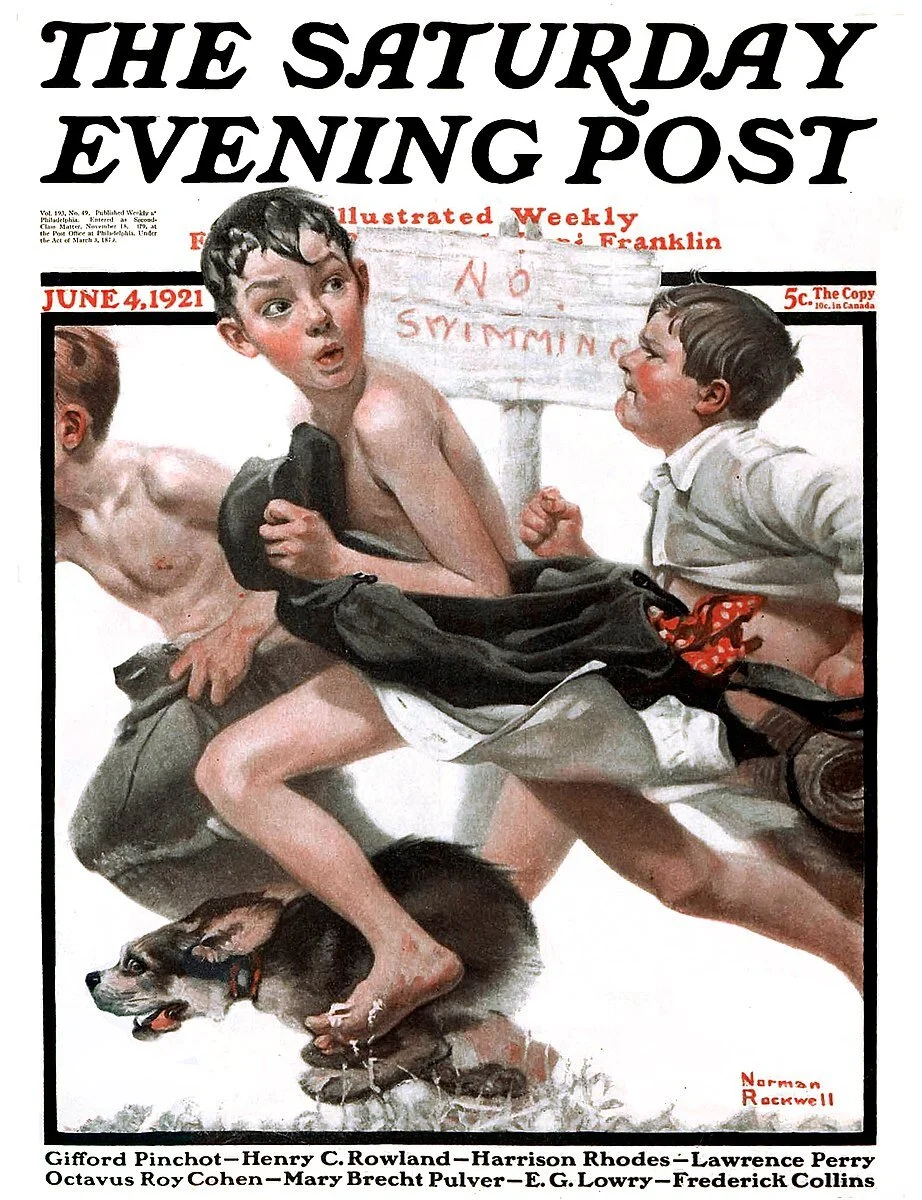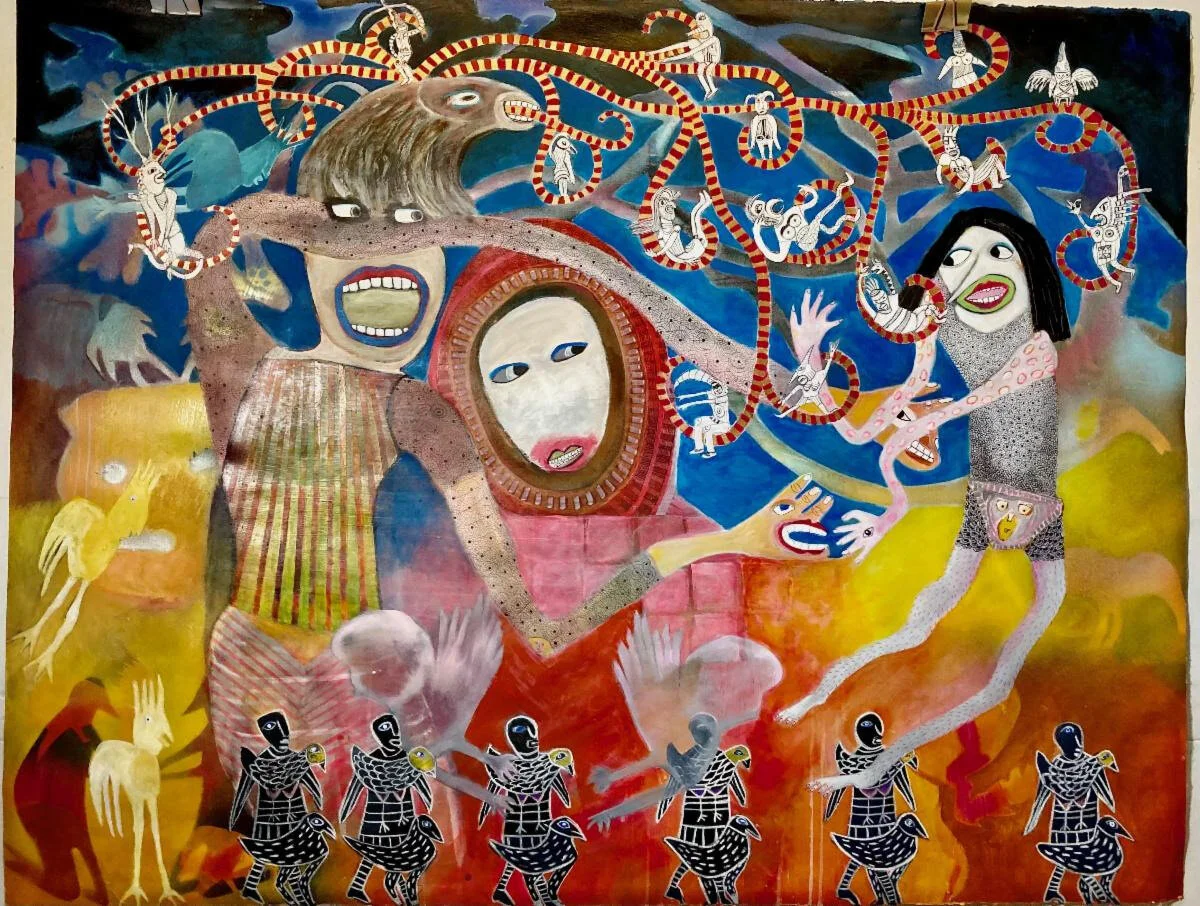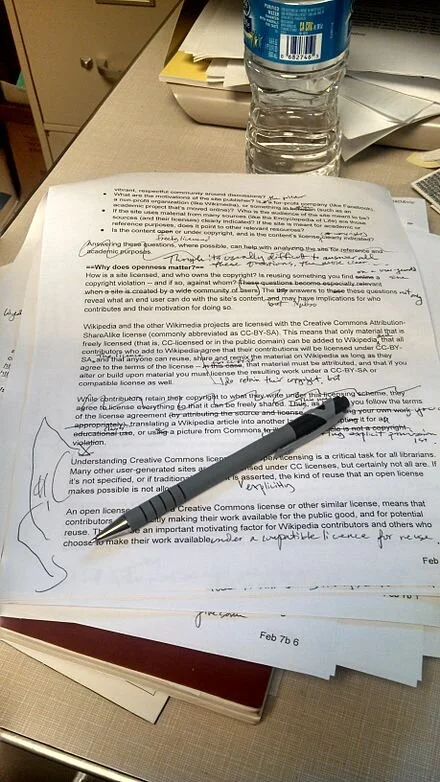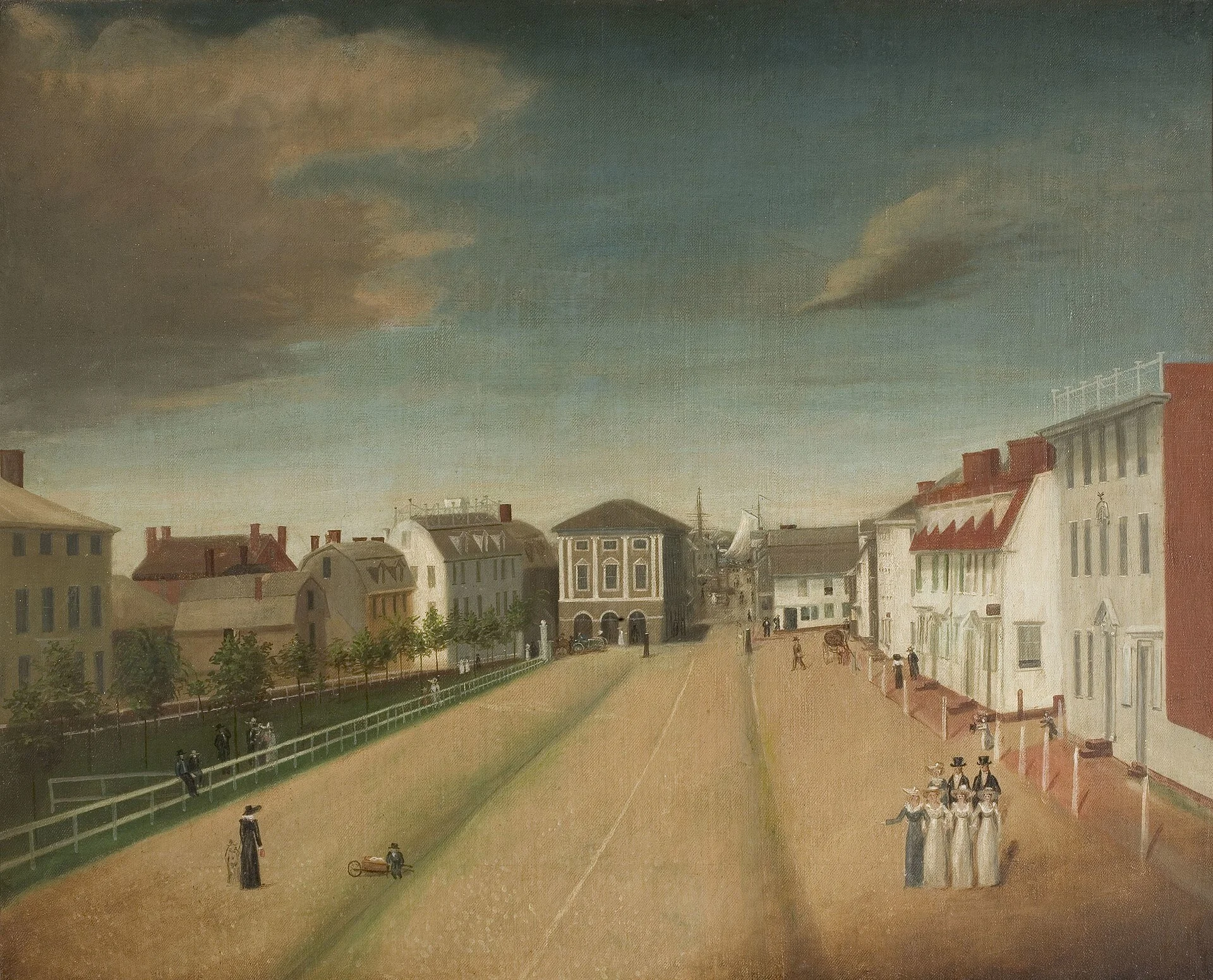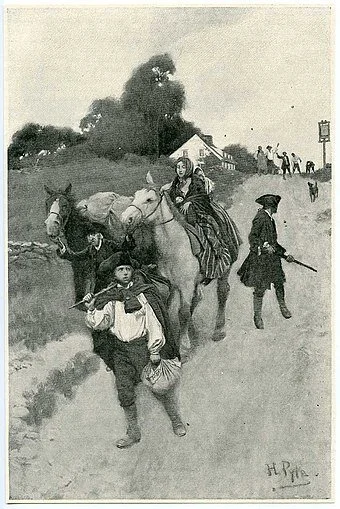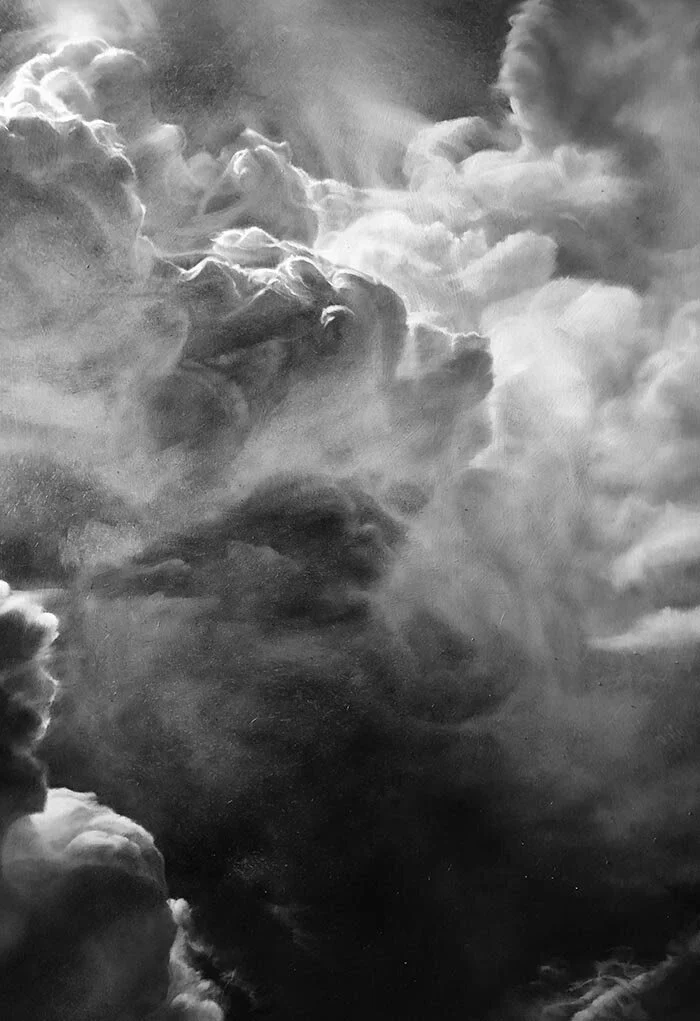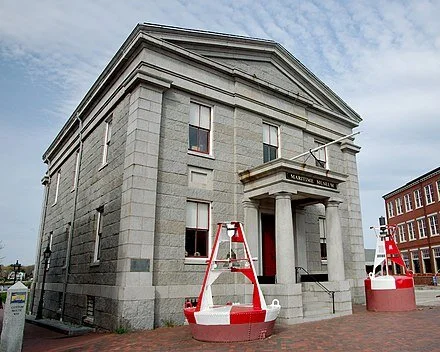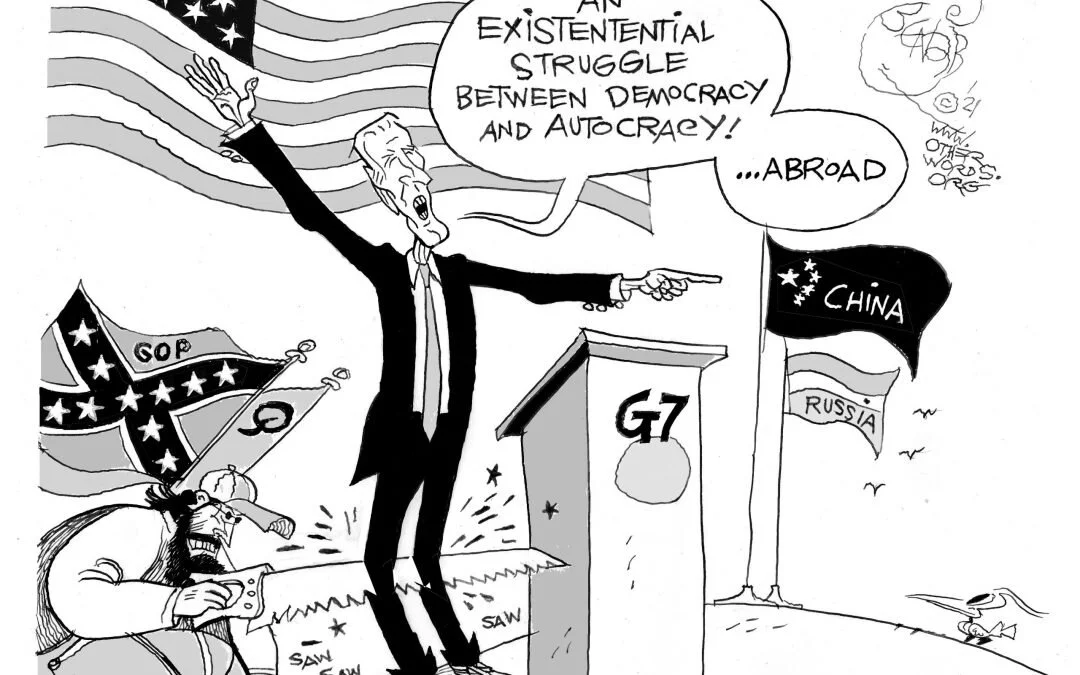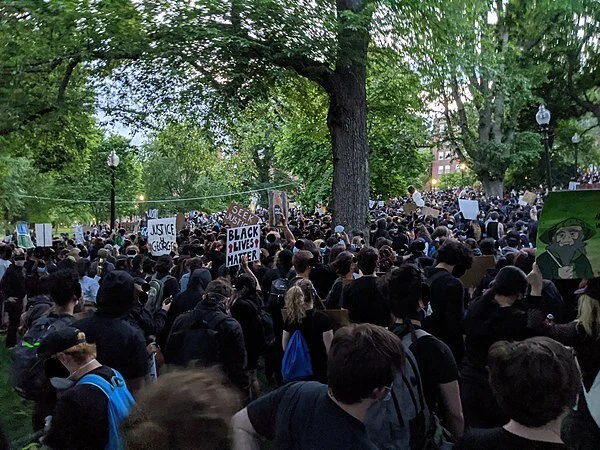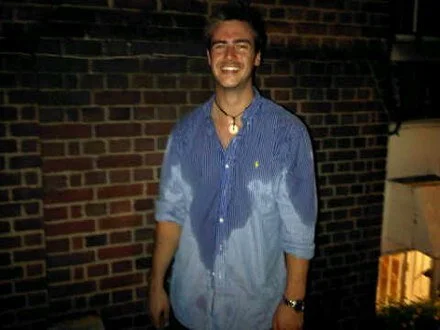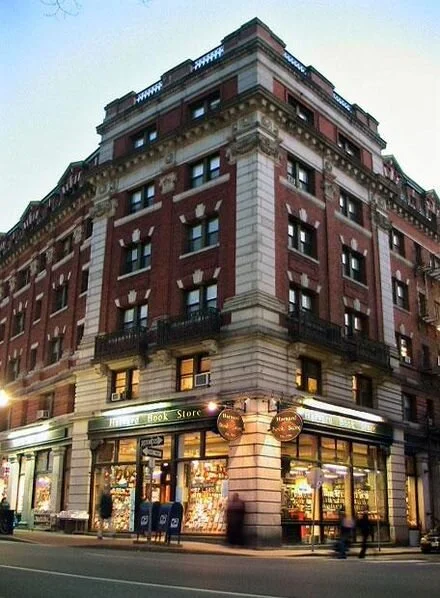
A green but dry Vermont
“Rock Bottom” cabin
Low water
From Robert Whitcomb’s “Digital Diary,’’ in GoLocal24.com
I spent much of the week before last mostly alone in a cabin (called “Rock Bottom”) by a trout stream in Vermont. It was sometimes a bit lonely but I did a lot of reading for pleasure, with delightfully little of it any use in work.
The owners of the cabin lived in a house in the woods up the rocky hill from the cabin. They are Mormons and so, as usually the case (at least in my experience) were very nice – available to chat but otherwise busying themselves with grass cutting and other chores on their spread, mostly out of my sight lines. I’d sometimes spot them in the distance reading on a bench by the little river, a scene that reminded me of an Impressionist painting.
The founder of the Church of Latter Day Saints (the Mormons), Joseph Smith, was born and spent some of his boyhood in nearby Sharon, Vt., where his parents were farmers. Many of the first Mormons hailed from rural New England before heading west.
Sadly, there were no trout in the stream, at least so far as I could see. While Vermont (as befits the French origin of its name – Green Mountain) looked verdant, the rivers and lakes were very low, as they are in most of northern New England now, and locals fear a bad forest-fire season. Climate change or natural variability (i.e., “weather’’)?
'Lake Wrong'
“Wrong is nothing and nowhere and takes
Its name from a great black bottomless lake,
The heart of which pranksters once marked with lipstick
On old newspaper nailed to a cane: “No Swimming.
Hunting or Fishing, Lake Wrong, Ha Ha Ha!’’
— From “Right and Wrong,’’ by Kenneth Rosen, a Portland, Maine, area poet and teacher
Something to do
A ship modeler with his Quoddy boat models, c. 1920s. Photograph by F.G. Milliken. Collection of the Cape Ann Museum Library & Archives, Gloucester, Mass.
Chris Powell: Nimbyism around New Haven airport vs. the public interest; anti-ID insanity
Tweed-New Haven Airport, alongside Long Island Sound
MANCHESTER, Conn.
Municipal zoning that controversially excludes inexpensive housing in the suburbs isn't the only area where Connecticut long has allowed the local interest to thwart the broader public interest. That is also the story of Tweed-New Haven Airport.
The governor, business leaders and most residents in the New Haven area who pay any attention favor improving Tweed so that people in the southern part of the state don't have to drive an hour or two to catch a flight that might not take even that long. The New Haven area, with plenty of commerce, industry and universities, including Yale, almost surely could support a real airport of its own, and such an airport would support the area's economic growth.
But since 2009 Connecticut actually has made it illegal to improve Tweed. That's when state legislators representing neighborhoods near the airport persuaded the General Assembly and then-Gov. Jodi Rell to enact a law forbidding the extension of the airport's runway beyond the current 5,600 feet even as a 7,000-foot runway is necessary to accommodate modern jetliners with enough seating to make serving the airport profitable.
Two years ago a federal appeals court found this state law contrary to federal law and invalidated it. But no matter how obvious the benefit of improving Tweed was, Connecticut still didn't repeal the law. At least now state government, New Haven city government, and town government in East Haven, where some airport property is situated, are working together not just to extend the runway but also to build a better terminal building and relocate airport access to the East Haven side.
The details of the plan may be arguable. Airport operator Avports will get a 43-year lease on Tweed and commit to spending millions of dollars improving it. The Tweed-New Haven Airport Authority, which is run by a board consisting of local residents, will lose control of the airport, but New Haven won't have to subsidize it anymore. Avports will solicit more flights to serve Tweed, for which the prospects are good, and a new budget airline is already planning to come in, though of course it may not survive long.
There may be stumbles and a "temporary" subsidy eventually might be sought from state government. Someday Tweed might even be taken over by the Connecticut Airport Authority. But state government already subsidizes the state's major airport, Bradley International, in Windsor Locks, and nobody complains about that, given the airport's huge contribution to Connecticut's economy and quality of life.
Tweed has been operating for 90 years, so no one living nearby can be surprised by the desire to improve it to keep up with population and economic growth. What might be surprising to people unfamiliar with Connecticut is that it has taken the state so long to get around to making Tweed really useful.
But then if a referendum on the state motto was ever called, no one in Connecticut could be surprised if the Nutmeg State’s official motto, Qui Transtulit Sustinet (“He Who Transplanted Still Sustains’’) is replaced by Non in me postica -- "Not in my backyard."
xxx
Just think of how comprehensively racist the country must be if, as the incessant racial prattle complains, requiring people to present photo identification when voting is racist.
For people routinely may be required to produce photo identification when, among other things, buying alcoholic beverages and tobacco products; when applying for a job, a bank account, a car loan, or home mortgage; and when boarding an airplane or entering a casino.
The purpose of requiring photo identification in those circumstances is simple: compliance with the law and prevention of fraud. Those are the same purposes for which presentation of photo identification when voting should be required.
Yes, some poor souls don't have photo identification, but most jurisdictions will provide general all-purpose photo IDs to people who can produce at least their birth certificates and evidence of an address.
Indeed, to facilitate violation of federal immigration law, Connecticut will provide driver's licenses and New Haven city government will provide city identification cards even to immigration lawbreakers.
Having to prove one's identification isn't racist at all. It's a small duty of modern citizenship.
Chris Powell is a columnist for the Journal Inquirer, in Manchester.
And keep it that way
“Secrets Never Told” (acrylic and ink on paper), by Deb Mell, in a group show through July 17 at the Berta Walker Gallery, Provincetown, Mass.
The gallery says:
“Deb Mell’s paintings and sculpture surprise at every turn, incorporating fantastic creatures, imaginative figures, beads, snake skins, feathers secured from hunters, metals and recycled material. ‘There is
nothing I won’t use. I think of the stuff I use as ‘my palette’’.
"Mell’s art defies easy categorization, much as did the now-famous ‘Chicago Hairy Who’ artists”.
David Warsh: Through the decades with my brilliant friend and occasional rescuer The Copy Editor
SOMERVILLE, Mass.
Economic Principals has been preparing for months to move to Substack’s publishing platform next week, figuring out what to bring and what to leave behind. A critical feature also will make the move: EP’s conscience, teacher and fellow-traveler, The Copy Editor.
We met mornings some forty years ago, walking to the paper {The Boston Globe} from the train. He was working in the library at the time, having turned down an offer from The Atlantic Monthly. I was a newly hired economics reporter. We’d attended the same college, Harvard, 15 years apart, and read some of the same books. We had undertaken similar undergraduate theses: his on historian Henry Adams and critic Edmund Wilson, in History and Literature; mine on Henry Adams and newspaper columnist Joseph Alsop, a China hand, in Social Studies. The Copy Editor finished his thesis with great distinction and graduated with high honors; I abandoned mine and graduated with no distinction.
Clear from the beginning was that he was unusually acute – more acute than I about many things; faster, too. One day without thinking I exaggerated the barriers I had run into as a quarter-miler in high school, claiming 51-second laps, perhaps, instead of 53-s? He had been an alternate in the mile relay for a team that had won the state championship. He forgave and remembered.
Before long he had moved to the book department. The Globe had some 550 editorial employees in those days. I keep a photo on the office wall of a house ad, “Every One’s a Critic:” fifteen lively souls arrayed on stools, The Copy Editor among them. By then it was clear that he was a prodigy; what was unusual was that he served as cook and bottle-washer as well. He displayed deeply ingrained habits: helping others, performing introductions, giving parties, constructing networks. We lived near one another, knew each other’s families and friends.
Certain things stand out, none more than “Wing Tips on the Beach,” a Sunday feature story that became one of three finalists in that category for a Pulitzer Prize in 1994. To this day, I have never read a more revealing interpretation of Richard Nixon than that meditation on a famous photograph of the former president. It did not win, but the author persevered, devising a more capacious framework for his story. When Nixon at the Movies: A Book about Belief appeared in 2004, it quickly gained a place on the relatively short shelf of indispensable second-generation receptions of the Nixon story. And when the Pulitzer finally came, in 2008, it was for criticism, specifically “For his penetrating and versatile command of the visual arts, from film and photography to painting.”
At some point The Copy Editor had begun to read what I wrote before I turned it over to the editor’s desk, to “save you from yourself,” he regularly explained. The tumult of the sale of the paper to The New York Times cost us much. He remained at The Globe and become ever more one of its foremost citizens, knowledgeably recalling in print the long-ago saga of the Bulger clan one week; visiting a museum or reviewing the latest edition of the Fast and Furious movies the next; educating the stream of talented newcomers to the paper all the while. He stayed with me, too, after I left the paper, in 2002.
Almost certainly I would not have kept at EP if he had not. We have had our occasional, sometimes major, differences of opinion. His relatively humble title is designed to emphasize that he is not responsible for opinions published here. But never have I had a friend as loyal, generous and shrewd as The Copy Editor.
David Warsh, a veteran columnist and an economic historian, is proprietor of Somerville-based economicprincipals.com, where this column originated.
Newport's entrepreneurial energy
“‘By 1760 Newport was humming with industry. As one old history states, “Newport was not the headquarters for piracy, sugar, smuggling, rum, molasses and slaves.’’’. But time had worked wonders. There is very little molasses or sugar used there now.’’
— Will M. Cressey, in The History of Rhode Island, published in the 1920’s
Newport in 1818
'Dupes to every factious rogue'
“Tory Refugees on their way to Canada,’’ by Howard Pyle
“MFingal - Canto II” (Connecticut-based John Trumbull’s (1750-1831) mock epic of the American Revolution.
Now warm with ministerial ire,
Fierce sallied forth our loyal 'Squire,
And on his striding steps attends
His desperate clan of Tory friends.
When sudden met his wrathful eye
A pole ascending through the sky,
Which numerous throngs of whiggish race
Were raising in the market-place.
Not higher school-boy's kites aspire,
Or royal mast, or country spire;
Like spears at Brobdignagian tilting,
Or Satan's walking-staff in Milton.
And on its top, the flag unfurl'd
Waved triumph o'er the gazing world,
Inscribed with inconsistent types
Of Liberty and thirteen stripes.
Beneath, the crowd without delay
The dedication-rites essay,
And gladly pay, in antient fashion,
The ceremonies of libation;
While briskly to each patriot lip
Walks eager round the inspiring flip:
Delicious draught! whose powers inherit
The quintessence of public spirit;
Which whoso tastes, perceives his mind
To nobler politics refined;
Or roused to martial controversy,
As from transforming cups of Circe;
Or warm'd with Homer's nectar'd liquor,
That fill'd the veins of gods with ichor.
At hand for new supplies in store,
The tavern opes its friendly door,
Whence to and fro the waiters run,
Like bucket-men at fires in town.
Then with three shouts that tore the sky,
'Tis consecrate to Liberty.
To guard it from th' attacks of Tories,
A grand Committee cull'd of four is;
Who foremost on the patriot spot,
Had brought the flip, and paid the shot.
By this, M'Fingal with his train
Advanced upon th' adjacent plain,
And full with loyalty possest,
Pour'd forth the zeal, that fired his breast.
"What mad-brain'd rebel gave commission,
To raise this May-pole of sedition?
Like Babel, rear'd by bawling throngs,
With like confusion too of tongues,
To point at heaven and summon down
The thunders of the British crown?
Say, will this paltry Pole secure
Your forfeit heads from Gage's power?
Attack'd by heroes brave and crafty,
Is this to stand your ark of safety;
Or driven by Scottish laird and laddie,
Think ye to rest beneath its shadow?
When bombs, like fiery serpents, fly,
And balls rush hissing through the sky,
Will this vile Pole, devote to freedom,
Save like the Jewish pole in Edom;
Or like the brazen snake of Moses,
Cure your crackt skulls and batter'd noses?
"Ye dupes to every factious rogue
And tavern-prating demagogue,
Whose tongue but rings, with sound more full,
On th' empty drumhead of his scull;
Behold you not what noisy fools
Use you, worse simpletons, for tools?
For Liberty, in your own by-sense,
Is but for crimes a patent license,
To break of law th' Egyptian yoke,
And throw the world in common stock;
Reduce all grievances and ills
To Magna Charta of your wills;
Establish cheats and frauds and nonsense,
Framed to the model of your conscience;
Cry justice down, as out of fashion,
And fix its scale of depreciation;
Defy all creditors to trouble ye,
And keep new years of Jewish jubilee;
Drive judges out, like Aaron's calves,
By jurisdiction of white staves,
And make the bar and bench and steeple
Submit t' our Sovereign Lord, The People;
By plunder rise to power and glory,
And brand all property, as Tory;
Expose all wares to lawful seizures
By mobbers or monopolizers;
Break heads and windows and the peace,
For your own interest and increase;
Dispute and pray and fight and groan
For public good, and mean your own;
Prevent the law by fierce attacks
From quitting scores upon your backs;
Lay your old dread, the gallows, low,
And seize the stocks, your ancient foe,
And turn them to convenient engines
To wreak your patriotic vengeance;
While all, your rights who understand,
Confess them in their owner's hand;
And when by clamours and confusions,
Your freedom's grown a public nuisance,
Cry "Liberty," with powerful yearning,
As he does "Fire!" whose house is burning;
Though he already has much more
Than he can find occasion for.
While every clown, that tills the plains,
Though bankrupt in estate and brains,
By this new light transform'd to traitor,
Forsakes his plough to turn dictator,
Starts an haranguing chief of Whigs,
And drags you by the ears, like pigs.
All bluster, arm'd with factious licence,
New-born at once to politicians.
Each leather-apron'd dunce, grown wise,
Presents his forward face t' advise,
And tatter'd legislators meet,
From every workshop through the street.
His goose the tailor finds new use in,
To patch and turn the Constitution;
The blacksmith comes with sledge and grate
To iron-bind the wheels of state;
The quack forbears his patients' souse,
To purge the Council and the House;
The tinker quits his moulds and doxies,
To cast assembly-men and proxies.
From dunghills deep of blackest hue,
Your dirt-bred patriots spring to view,
To wealth and power and honors rise,
Like new-wing'd maggots changed to flies,
And fluttering round in high parade,
Strut in the robe, or gay cockade.
See Arnold quits, for ways more certain,
His bankrupt-perj'ries for his fortune,
Brews rum no longer in his store,
Jockey and skipper now no more,
Forsakes his warehouses and docks,
And writs of slander for the pox;
And cleansed by patriotism from shame,
Grows General of the foremost name.
For in this ferment of the stream
The dregs have work'd up to the brim,
And by the rule of topsy-turvies,
The scum stands foaming on the surface.
You've caused your pyramid t' ascend,
And set it on the little end.
Like Hudibras, your empire's made,
Whose crupper had o'ertopp'd his head.
You've push'd and turn'd the whole world up-
Side down, and got yourselves at top,
While all the great ones of your state
Are crush'd beneath the popular weight;
Nor can you boast, this present hour,
The shadow of the form of power.
For what's your Congress or its end?
A power, t' advise and recommend;
To call forth troops, adjust your quotas--
And yet no soul is bound to notice;
To pawn your faith to th' utmost limit,
But cannot bind you to redeem it;
And when in want no more in them lies,
Than begging from your State-Assemblies;
Can utter oracles of dread,
Like friar Bacon's brazen head,
But when a faction dares dispute 'em,
Has ne'er an arm to execute 'em:
As tho' you chose supreme dictators,
And put them under conservators.
You've but pursued the self-same way
With Shakespeare's Trinc'lo in the play;
"You shall be Viceroys here, 'tis true,
"But we'll be Viceroys over you.’’
What wild confusion hence must ensue?
Tho' common danger yet cements you:
So some wreck'd vessel, all in shatters,
Is held up by surrounding waters,
But stranded, when the pressure ceases,
Falls by its rottenness to pieces.
And fall it must! if wars were ended,
You'll ne'er have sense enough to mend it:
But creeping on, by low intrigues,
Like vermin of a thousand legs,
'Twill find as short a life assign'd,
As all things else of reptile kind.
Your Commonwealth's a common harlot,
The property of every varlet;
Which now in taste, and full employ,
All sorts admire, as all enjoy:
But soon a batter'd strumpet grown,
You'll curse and drum her out of town.
Such is the government you chose;
For this you bade the world be foes;
For this, so mark'd for dissolution,
You scorn the British Constitution,
That constitution form'd by sages,
The wonder of all modern ages;
Which owns no failure in reality,
Except corruption and venality;
And merely proves the adage just,
That best things spoil'd corrupt to worst:
So man supreme in earthly station,
And mighty lord of this creation,
When once his corse is dead as herring,
Becomes the most offensive carrion,
And sooner breeds the plague, 'tis found,
Than all beasts rotting on the ground.
Yet with republics to dismay us,
You've call'd up Anarchy from chaos,
With all the followers of her school,
Uproar and Rage and wild Misrule:
For whom this rout of Whigs distracted,
And ravings dire of every crack'd head;
These new-cast legislative engines
Of County-meetings and Conventions;
Committees vile of correspondence,
And mobs, whose tricks have almost undone 's:
While reason fails to check your course,
And Loyalty's kick'd out of doors,
And Folly, like inviting landlord,
Hoists on your poles her royal standard;
While the king's friends, in doleful dumps,
Have worn their courage to the stumps,
And leaving George in sad disaster,
Most sinfully deny their master.
What furies raged when you, in sea,
In shape of Indians, drown'd the tea;
When your gay sparks, fatigued to watch it,
Assumed the moggison and hatchet,
With wampum'd blankets hid their laces,
And like their sweethearts, primed their faces:
While not a red-coat dared oppose,
And scarce a Tory show'd his nose;
While Hutchinson, for sure retreat,
Manoeuvred to his country seat,
And thence affrighted, in the suds,
Stole off bareheaded through the woods.
"Have you not roused your mobs to join,
And make Mandamus-men resign,
Call'd forth each dufill-drest curmudgeon,
With dirty trowsers and white bludgeon,
Forced all our Councils through the land,
To yield their necks at your command;
While paleness marks their late disgraces,
Through all their rueful length of faces?
"Have you not caused as woeful work
In our good city of New-York,
When all the rabble, well cockaded,
In triumph through the streets paraded,
And mobb'd the Tories, scared their spouses,
And ransack'd all the custom-houses;
Made such a tumult, bluster, jarring,
That mid the clash of tempests warring,
Smith's weather-cock, in veers forlorn,
Could hardly tell which way to turn?
Burn'd effigies of higher powers,
Contrived in planetary hours;
As witches with clay-images
Destroy or torture whom they please:
Till fired with rage, th' ungrateful club
Spared not your best friend, Beelzebub,
O'erlook'd his favors, and forgot
The reverence due his cloven foot,
And in the selfsame furnace frying,
Stew'd him, and North and Bute and Tryon?
Did you not, in as vile and shallow way,
Fright our poor Philadelphian, Galloway,
Your Congress, when the loyal ribald
Belied, berated and bescribbled?
What ropes and halters did you send,
Terrific emblems of his end,
Till, least he'd hang in more than effigy,
Fled in a fog the trembling refugee?
Now rising in progression fatal,
Have you not ventured to give battle?
When Treason chaced our heroes troubled,
With rusty gun, and leathern doublet;
Turn'd all stone-walls and groves and bushes,
To batteries arm'd with blunderbusses;
And with deep wounds, that fate portend,
Gaul'd many a Briton's latter end;
Drove them to Boston, as in jail,
Confined without mainprize or bail.
Were not these deeds enough betimes,
To heap the measure of your crimes:
But in this loyal town and dwelling,
You raise these ensigns of rebellion?
'Tis done! fair Mercy shuts her door;
And Vengeance now shall sleep no more.
Rise then, my friends, in terror rise,
And sweep this scandal from the skies.
You'll see their Dagon, though well jointed,
Will shrink before the Lord's anointed;
And like old Jericho's proud wall,
Before our ram's horns prostrate fall.’’
This said, our 'Squire, yet undismay'd,
Call'd forth the Constable to aid,
And bade him read, in nearer station,
The Riot-act and Proclamation.
He swift, advancing to the ring,
Began, "Our Sovereign Lord, the King"--
When thousand clam'rous tongues he hears,
And clubs and stones assail his ears.
To fly was vain; to fight was idle;
By foes encompass'd in the middle,
His hope, in stratagems, he found,
And fell right craftily to ground;
Then crept to seek an hiding place,
'Twas all he could, beneath a brace;
Where soon the conq'ring crew espied him,
And where he lurk'd, they caught and tied him.
At once with resolution fatal,
Both Whigs and Tories rush'd to battle.
Instead of weapons, either band
Seized on such arms as came to hand.
And as famed Ovid paints th' adventures
Of wrangling Lapithæ and Centaurs,
Who at their feast, by Bacchus led,
Threw bottles at each other's head;
And these arms failing in their scuffles,
Attack'd with andirons, tongs and shovels:
So clubs and billets, staves and stones
Met fierce, encountering every sconce,
And cover'd o'er with knobs and pains
Each void receptacle for brains;
Their clamours rend the skies around,
The hills rebellow to the sound;
And many a groan increas'd the din
From batter'd nose and broken shin.
M'Fingal, rising at the word,
Drew forth his old militia-sword;
Thrice cried "King George," as erst in distress,
Knights of romance invoked a mistress;
And brandishing the blade in air,
Struck terror through th' opposing war.
The Whigs, unsafe within the wind
Of such commotion, shrunk behind.
With whirling steel around address'd,
Fierce through their thickest throng he press'd,
(Who roll'd on either side in arch,
Like Red Sea waves in Israel's march)
And like a meteor rushing through,
Struck on their Pole a vengeful blow.
Around, the Whigs, of clubs and stones
Discharged whole vollies, in platoons,
That o'er in whistling fury fly;
But not a foe dares venture nigh.
And now perhaps with glory crown'd
Our 'Squire had fell'd the pole to ground,
Had not some Pow'r, a whig at heart,
Descended down and took their part;
(Whether 'twere Pallas, Mars or Iris,
'Tis scarce worth while to make inquiries)
Who at the nick of time alarming,
Assumed the solemn form of Chairman,
Address'd a Whig, in every scene
The stoutest wrestler on the green,
And pointed where the spade was found,
Late used to set their pole in ground,
And urged, with equal arms and might,
To dare our 'Squire to single fight.
The Whig thus arm'd, untaught to yield,
Advanced tremendous to the field:
Nor did M'Fingal shun the foe,
But stood to brave the desp'rate blow;
While all the party gazed, suspended
To see the deadly combat ended;
And Jove in equal balance weigh'd
The sword against the brandish'd spade,
He weigh'd; but lighter than a dream,
The sword flew up, and kick'd the beam.
Our 'Squire on tiptoe rising fair
Lifts high a noble stroke in air,
Which hung not, but like dreadful engines,
Descended on his foe in vengeance.
But ah! in danger, with dishonor
The sword perfidious fails its owner;
That sword, which oft had stood its ground,
By huge trainbands encircled round;
And on the bench, with blade right loyal,
Had won the day at many a trial,
Of stones and clubs had braved th' alarms,
Shrunk from these new Vulcanian arms.
The spade so temper'd from the sledge,
Nor keen nor solid harm'd its edge,
Now met it, from his arm of might,
Descending with steep force to smite;
The blade snapp'd short--and from his hand,
With rust embrown'd the glittering sand.
Swift turn'd M'Fingal at the view,
And call'd to aid th' attendant crew,
In vain; the Tories all had run,
When scarce the fight was well begun;
Their setting wigs he saw decreas'd
Far in th' horizon tow'rd the west.
Amazed he view'd the shameful sight,
And saw no refuge, but in flight:
But age unwieldy check'd his pace,
Though fear had wing'd his flying race;
For not a trifling prize at stake;
No less than great M'Fingal's back.
With legs and arms he work'd his course,
Like rider that outgoes his horse,
And labor'd hard to get away, as
Old Satan struggling on through chaos;
Till looking back, he spied in rear
The spade-arm'd chief advanced too near:
Then stopp'd and seized a stone, that lay
An ancient landmark near the way;
Nor shall we as old bards have done,
Affirm it weigh'd an hundred ton;
But such a stone, as at a shift
A modern might suffice to lift,
Since men, to credit their enigmas,
Are dwindled down to dwarfs and pigmies,
And giants exiled with their cronies
To Brobdignags and Patagonias.
But while our Hero turn'd him round,
And tugg'd to raise it from the ground,
The fatal spade discharged a blow
Tremendous on his rear below:
His bent knee fail'd, and void of strength
Stretch'd on the ground his manly length.
Like ancient oak o'erturn'd, he lay,
Or tower to tempests fall'n a prey,
Or mountain sunk with all his pines,
Or flow'r the plow to dust consigns,
And more things else--but all men know 'em,
If slightly versed in epic poem.
At once the crew, at this dread crisis,
Fall on, and bind him, ere he rises;
And with loud shouts and joyful soul,
Conduct him prisoner to the pole.
When now the mob in lucky hour
Had got their en'mies in their power,
They first proceed, by grave command,
To take the Constable in hand.
Then from the pole's sublimest top
The active crew let down the rope,
At once its other end in haste bind,
And make it fast upon his waistband;
Till like the earth, as stretch'd on tenter,
He hung self-balanced on his centre.
Then upwards, all hands hoisting sail,
They swung him, like a keg of ale,
Till to the pinnacle in height
He vaulted, like balloon or kite.
As Socrates of old at first did
To aid philosophy get hoisted,
And found his thoughts flow strangely clear,
Swung in a basket in mid air:
Our culprit thus, in purer sky,
With like advantage raised his eye,
And looking forth in prospect wide,
His Tory errors clearly spied,
And from his elevated station,
With bawling voice began addressing.
"Good Gentlemen and friends and kin,
For heaven's sake hear, if not for mine!
I here renounce the Pope, the Turks,
The King, the Devil and all their works;
And will, set me but once at ease,
Turn Whig or Christian, what you please;
And always mind your rules so justly,
Should I live long as old Methus'lah,
I'll never join in British rage,
Nor help Lord North, nor Gen'ral Gage;
Nor lift my gun in future fights,
Nor take away your Charter-rights;
Nor overcome your new-raised levies,
Destroy your towns, nor burn your navies;
Nor cut your poles down while I've breath,
Though raised more thick than hatchel-teeth:
But leave King George and all his elves
To do their conq'ring work themselves.’’
This said, they lower'd him down in state,
Spread at all points, like falling cat;
But took a vote first on the question,
That they'd accept this full confession,
And to their fellowship and favor,
Restore him on his good behaviour.
Not so our 'Squire submits to rule,
But stood, heroic as a mule.
"You'll find it all in vain, quoth he,
To play your rebel tricks on me.
All punishments, the world can render,
Serve only to provoke th' offender;
The will gains strength from treatment horrid,
As hides grow harder when they're curried.
No man e'er felt the halter draw,
With good opinion of the law;
Or held in method orthodox
His love of justice, in the stocks;
Or fail'd to lose by sheriff's shears
At once his loyalty and ears.
Have you made Murray look less big,
Or smoked old Williams to a Whig?
Did our mobb'd Ol'ver quit his station,
Or heed his vows of resignation?
Has Rivington, in dread of stripes,
Ceased lying since you stole his types?
And can you think my faith will alter,
By tarring, whipping or the halter?
I'll stand the worst; for recompense
I trust King George and Providence.
And when with conquest gain'd I come,
Array'd in law and terror home,
Ye'll rue this inauspicious morn,
And curse the day, when ye were born,
In Job's high style of imprecations,
With all his plagues, without his patience.’’
Meanwhile beside the pole, the guard
A Bench of Justice had prepared,
Where sitting round in awful sort
The grand Committee hold their Court;
While all the crew, in silent awe,
Wait from their lips the lore of law.
Few moments with deliberation
They hold the solemn consultation;
When soon in judgment all agree,
And Clerk proclaims the dread decree;
"That 'Squire M'Fingal having grown
The vilest Tory in the town,
And now in full examination
Convicted by his own confession,
Finding no tokens of repentance,
This Court proceeds to render sentence:
That first the Mob a slip-knot single
Tie round the neck of said M'Fingal,
And in due form do tar him next,
And feather, as the law directs;
Then through the town attendant ride him
In cart with Constable beside him,
And having held him up to shame,
Bring to the pole, from whence he came.’’
Forthwith the crowd proceed to deck
With halter'd noose M'Fingal's neck,
While he in peril of his soul
Stood tied half-hanging to the pole;
Then lifting high the ponderous jar,
Pour'd o'er his head the smoking tar.
With less profusion once was spread
Oil on the Jewish monarch's head,
That down his beard and vestments ran,
And cover'd all his outward man.
As when (so Claudian sings) the Gods
And earth-born Giants fell at odds,
The stout Enceladus in malice
Tore mountains up to throw at Pallas;
And while he held them o'er his head,
The river, from their fountains fed,
Pour'd down his back its copious tide,
And wore its channels in his hide:
So from the high-raised urn the torrents
Spread down his side their various currents;
His flowing wig, as next the brim,
First met and drank the sable stream;
Adown his visage stern and grave
Roll'd and adhered the viscid wave;
With arms depending as he stood,
Each cuff capacious holds the flood;
From nose and chin's remotest end,
The tarry icicles descend;
Till all o'erspread, with colors gay,
He glitter'd to the western ray,
Like sleet-bound trees in wintry skies,
Or Lapland idol carved in ice.
And now the feather-bag display'd
Is waved in triumph o'er his head,
And clouds him o'er with feathers missive,
And down, upon the tar, adhesive:
Not Maia's son, with wings for ears,
Such plumage round his visage wears;
Nor Milton's six-wing'd angel gathers
Such superfluity of feathers.
Now all complete appears our 'Squire,
Like Gorgon or Chimæra dire;
Nor more could boast on Plato's plan
To rank among the race of man,
Or prove his claim to human nature,
As a two-legg'd, unfeather'd creature.
Then on the fatal cart, in state
They raised our grand Duumvirate.
And as at Rome a like committee,
Who found an owl within their city,
With solemn rites and grave processions
At every shrine perform'd lustrations;
And least infection might take place
From such grim fowl with feather'd face,
All Rome attends him through the street
In triumph to his country seat:
With like devotion all the choir
Paraded round our awful 'Squire;
In front the martial music comes
Of horns and fiddles, fifes and drums,
With jingling sound of carriage bells,
And treble creak of rusted wheels.
Behind, the croud, in lengthen'd row
With proud procession, closed the show.
And at fit periods every throat
Combined in universal shout;
And hail'd great Liberty in chorus,
Or bawl'd 'confusion to the Tories.
Not louder storm the welkin braves
From clamors of conflicting waves;
Less dire in Lybian wilds the noise
When rav'ning lions lift their voice;
Or triumphs at town-meetings made,
On passing votes to regulate trade.
Thus having borne them round the town,
Last at the pole they set them down;
And to the tavern take their way
To end in mirth the festal day.
And now the Mob, dispersed and gone,
Left 'Squire and Constable alone.
The constable with rueful face
Lean'd sad and solemn o'er a brace;
And fast beside him, cheek by jowl,
Stuck 'Squire M'Fingal 'gainst the pole,
Glued by the tar t' his rear applied,
Like barnacle on vessel's side.
But though his body lack'd physician,
His spirit was in worse condition.
He found his fears of whips and ropes
By many a drachm outweigh'd his hopes.
As men in jail without mainprize
View every thing with other eyes,
And all goes wrong in church and state,
Seen through perspective of the grate:
So now M'Fingal's Second-sight
Beheld all things in gloomier light;
His visual nerve, well purged with tar,
Saw all the coming scenes of war.
As his prophetic soul grew stronger,
He found he could hold in no longer.
First from the pole, as fierce he shook,
His wig from pitchy durance broke,
His mouth unglued, his feathers flutter'd,
His tarr'd skirts crack'd, and thus he utter'd.
"Ah, Mr.
Constable, in vain
We strive 'gainst wind and tide and rain!
Behold my doom! this feathery omen
Portends what dismal times are coming.
Now future scenes, before my eyes,
And second-sighted forms arise.
I hear a voice, that calls away,
And cries 'The Whigs will win the day’.
My beck'ning Genius gives command,
And bids me fly the fatal land;
Where changing name and constitution,
Rebellion turns to Revolution,
While Loyalty, oppress'd, in tears,
Stands trembling for its neck and ears.
"Go, summon all our brethren, greeting,
To muster at our usual meeting;
There my prophetic voice shall warn 'em
Of all things future that concern 'em,
And scenes disclose on which, my friend,
Their conduct and their lives depend.
There I--but first 'tis more of use,
From this vile pole to set me loose;
Then go with cautious steps and steady,
While I steer home and make all ready.
‘Are melted into air’
From Jennifer Day’s show “Vapors,’ June 30-Aug. 1, at Bromfield Gallery, Boston. The show consists of black-and-white paintings that explore how liquids, mist and light interact. Ms. Day is based in Newburyport.
Prospero’s soliloquy in Shakespeare’s The Tempest:
Our revels now are ended. These our actors,
As I foretold you, were all spirits, and
Are melted into air, into thin air:
And like the baseless fabric of this vision,
The cloud-capp'd tow'rs, the gorgeous palaces,
The solemn temples, the great globe itself,
Yea, all which it inherit, shall dissolve,
And, like this insubstantial pageant faded,
Leave not a rack behind. We are such stuff
As dreams are made on; and our little life
Is rounded with a sleep.
The Custom House Maritime Museum, in Newburyport
“Hunter in the Meadows of Old Newburyport, Massachusetts” (c. 1873), by Alfred Thompson Bricher. The scene seems to be near the Little River. Route 1 (aka Boston Post Road) had an overlook easily accessible to artists. In the far right can be seen the ridge along the Merrimack River over which High Street runs. Cattle have been turned into the marsh for pasture, a practice still allowed on some marsh farms of the area in the late 19th Century.
The Hub from heaven
Downtown Boston in 1860, before urban renewal and presumably from a hot-air balloon
‘Stormbags’ over the mountains
The Presidential Range of the White Mountains
“Thunderheads were pouring toward them through the ragged teeth of the White Mountains, and Lisey counted seven dark spots where the high slopes had been smudged away by cauls of rain. Brilliant lightnings flashed inside those stormbags and between those two of them, connecting them like some fantastic fairy bridge, was a double rainbow that arched over Mount Cranmore in a frayed loophole of blue.”
— From Lisey’s Story, by the Maine-based novelist Stephen King
“Crawford Notch’’ (1872), in the White Mountains, by Thomas Hill (1829-1908)
‘Deeper inside domestic objects’
“Purple & Yellow” (accordion book with photographs), by Laura Holland, in the show “Inward & Outward’’ at Gallery A3, in Amherst, Mass., for July.
The gallery says that for Holland “home {during the pandemic} became my world, I discovered small-scale intimate still lives in eggshells on the counter, carrot peels in the sink, and pans of soapy water...I peered deeper inside domestic objects and pushed images further toward abstraction, which turned into the books of photographs.’’
Don Pesci: A reunion at the end of the plague time
“Diogenes Searching for an Honest Man:”(c. 1780) attributed to J. H. W. Tischbein. Diogenes (about 412 to 323 B.C.), a Greek, was a one of the founders of Cynic philosophy.
VERNON, Conn.
The Country Mouse looked his friend over carefully. He hadn’t so much as spoken word to him in nearly a half century. The Cynic was much the same.
The timeless features of humans – the sound of the voice, the color of eye, the general bone structure of the face, a smile in motion – remain steadfastly constant. And, of course, though The Cynic was still tall, he had put on some pounds and his muscles were in retreat. He still had a full head of hair, tinged with white. Genetics are decisive, thought The Country Mouse.
“Do you remember.…” The Cynic a week earlier had begun their phone call.
For The Country Mouse, this was an incantation that had always opened the mercifully locked doors of memory that connected him immediately with a specific painful or joyous moment.
Before The Cynic had finished the sentence, a scene flashed like lightening through The Country Mouse’s mind. He saw them both traveling in an old rowboat ladened with cement bags towards a small island a half mile off the mainland.
The two were to build a wall around the island, owned by a dentist who would, at some distant point in the future, build his retirement house there. Walls make good neighbors, but lakes, particularly when one is on an island surrounded by water, make better ones.
That was why Orwell, said The Cynic, retreated to the remote Scottish Island of Jura to stretch his mind around Nineteen Eighty-Four. It was why the monks of the dessert took to the dessert, to better commune with the molten God burning in their souls. And it was why Antisthenes, thought to be the father of Greek Cynicism, established his school in a famous gymnasium built to service the nothoi, the bastard children of Athens.
The Cynic, nearly always a solitary, had asked The Country Mouse to help him build the wall, a self-terminating endeavor, thought The Cynic, because the unpredictable effects on water disturbed by wind, rain and the pull of moon will overturn even the best laid plans of mice and men. But the pay was a bonus for the two student roommates who needed pocket money from time to time.
It was summer; the lake was blue ice, its quiet surface hiding the clamor and rough motion below the surface. What if the old boat sank? Would any attempt be made to save the cement? Would one, or both the project managers, drown, pushed under the quiet surface of the lake by a weight of weakness and ungovernable laughter?
“Who could forget that wall?” The Country Mouse had replied, before making arrangements to meet at a local diner.
Not he, not ever. The job amused The Cynic. His unappeasable κυνικός burst forth not in frowns but in what he called therapeutic laughter. Laughter, he had once told The Country Mouse are tears turned, like socks, inside out.
“Comedy,” he said, “is the tragedy that happens to your worst enemy.”
And now here was his old friend in the flesh. There was no “catching up” between these two. Heart spoke to heart. Time was foreshortened, and the two picked up pretty much where they had left off. Friendship, The Country Mouse thought, is rooted in requited expectation.
The Cynic, like The Country Mouse, was no stranger to politics. Both had written about Connecticut’s political absurdities for more than 30 years, and each had followed the other’s occasional writings, though neither had felt the need to reestablish contact, perhaps from fear that re-contact would abort a cherished friendship. Why spoil the past by resurrecting it, dripping with mold and moss, from its comfortable grave?
The Cynic had proposed a project that would allow both of them to create a semi-perishable narrative that might be of interest to people not too far gone in partisanship, as is the case, The Cynic pointed out, “with nearly 90 percent of the state’s highly compromised media. Searching for dispassionate reportage from this group was like searching in a whore house for glints of modesty and shards of morality, not,” he hastened to add, “that immorality was a bar to honest truth seeking.”
“Your figure might be low,” The Country Mouse replied, though he instantly had accepted the proposal.
Both had for the past three decades been “writing on water,” The Cynic’s formulation, for a slumberous audience that could not, or perversely would not, recall what had happened yesterday. Then too, the windy horror stirring on Connecticut’s horizon hardly ruffled these bouts of self-enforced somnolence. Working in the moment had unfitted them for unabashed journalism. So, why not disturb some restless ghosts?
“We should,” said The Cynic, bestowing a smile upon his omelet, “draw up an enemies' list.”
“A friend’s list,” said The Country Mouse, “would be shorter and more manageable. I can think of two reliables.”
“None for me,” said The Cynic.
Now, whenever The Cynic’s temperament was aroused, his voice, rose as well, and he pronounced every syllable of every word as a Shakespearian actor might. Naturally, this captured the attention of nearby diners who began leaning into the conversation.
Responding to The Country Mouse’s remark that beaten people in Connecticut seemed emotionally exhausted by measures that had been taken to shut down the state, The Cynic launched the following philippic:
“At some point, someone – and if not the media, then who? – must scream loudly enough to pierce waxen ears -- ‘THE EMPEROR IS NAKED!”’
This produced a stir at a nearby table.
“Too few in the state’s media do it,” The Cynic continued. “Politics is the only profession on earth that professes nonsense without media reproval. We’ve just recovered from a Coronavirus ‘pandemic.’ The entire state was shut down – and NOT BY THE PANDEMIC – for a year.
“Just take one instance, and try to remember that the state’s political hegemon, the Democratic Party, has controlled politics, without the least interference from Republicans, in all three of the state’s larger cities for nearly half a century, plenty of time to set things right.
“Whatever is wrong with Connecticut’s cities, the solution to urban social disintegration and lawlessness cannot be a bill to provide previously illegal pot in every urban pot.”
This produced some suppressed laughter from a couple sitting in a nearby booth.”
“Urban problems cannot be solved,” The Cynic continued in a lower voice, “or even addressed, by a state that asserts the elimination of zoning restrictions in suburbs will magically solve problems in cities related to causes untouched by the proposed solution.”
This produced slight applause and appreciative nods and smiles from a different booth.
Quieter still, The Cynic continued, “Removing partial immunity from prosecution within urban police departments will not reduce criminal activity in the state’s cities. Still less will early release from prison and the decriminalization of crimes reduce criminal activity in cities, though it may improve the kinds of statistics politicians cite in the heat of a campaign. The elimination of partial immunity celebrated by Connecticut’s progressive Democrats will reduce the number of police in urban police departments. In fact, a little noticed migration of police officers from urban to suburban departments has already begun. And it cannot be good sense to reduce police presence at a time when crime in urban areas is “MOVING FORWARD,” a favorite expression of blind progressive mice, at warp speed. Any politician unwilling to attack the rot at the root of a problem cannot be said to care for the plant.”
A lady to the left of the two reunited friends waved her fork in their direction. All the Coronavirus protective masks in the diner had been discarded. For the first time in a year, both The Country Mouse and The Cynic, who regarded the masks as emblems of subservience to autocratic governors, could once again read faces. And this one was smiling, the Country Mouse thought, sardonically.
“Excuse me,” she said, “who ARE you?”
“He’s The Cynic,” answered The Country Mouse.
Don Pesci is a Vernon-based columnist.
Sara Jean-Francois: Attacks on Critical Race Theory suppress racial liberation and free speech
Rally on the Boston Common on May 31, 2020 after the murder of George Floyd
From The New England Journal of Higher Education, a service of The New England Board of Higher Education (nebhe.org)
BOSTON
When I was in elementary school, history happened like this: The world was fighting, the Civil War happened, Abraham Lincoln freed the slaves and then everything was happy and free, and the U.S. was the place to be. Now obviously that is a gross exaggeration of the facts. But it’s not untrue about what we as role models, educators, parents and guardians chose to disclose to children about the historical legacy of race and, thus racism, in the U.S.
As a Black girl growing up in a wide variety of neighborhoods, but almost always attending a predominantly Black and ethnically diverse school, it strikes me as inherently odd that even as K-12 schools and higher education begin to educate an increasingly diverse set of students, we can simultaneously remain complicit in the concealment of history as it is, not as we have decided to rewrite it.
Last year, shortly after the murder of George Floyd, Ahmaud Arbery and so many others, it seemed as if the world had finally opened their eyes to the everyday reality and fears of Black America. And yet, just after the anniversary of these murders, we see state legislation in the headlines of various news sites attacking Critical Race Theory (CRT) and actually proposing legislation that would ban teaching history, as it is commonly accepted to be true. We cannot deny that woven into the narrative of U.S history is the history of systemic racism and other oppressions.
“Divisive” concepts?
Many have coined the term “divisive teaching” to describe teaching from what would be considered a culturally relevant and historically accurate account of race and racism in the U.S.
In Iowa, legislation has been passed that would explicitly forbid teaching of systemic racism or sexism. And Iowa is not alone. Earlier this year, Oklahoma banned CRT, causing a chain reaction of lost course offerings for students who want to learn about the true history of race in the U.S. In New England, the New Hampshire legislators approved a bill that would ban the teaching of “divisive concepts,” including topics of inherent racism, sexism or oppression, whether consciously or unconsciously. (Similar bills have been introduced in Maine and Rhode Island.)
The Iowa, New Hampshire and Oklahoma legislation attack the discussion of systemic racism head-on, leaving the potential for an entire generation of young people to grow up with the same implicit bias, bigotry and stereotypes that have led to the death of so many Black Bodies already, including George Floyd. They are just three examples of how legislative attacks on Critical Race Theory are directly trying to use politics to attack racial progression. It raises the question, will there ever be a post-racial society?
For the past year, as so much of the world shouted “Black Lives Matter,” whether at protests, through statements of solidarity, posting little black boxes on Instagram, T-shirts, or supporting Black-owned businesses, we all felt the weight of racism in the air. We saw how racism breeds real-life consequences, and for Black people, that can mean death.
Yet here we are, concerned with the state of academic freedom, rather than about what it means for the future generation of Black bodies in the U.S. Somewhat ironically, news reports about these pieces of legislation follow the official national recognition of Juneteenth as a federal holiday. This irony begs the question: Is America moving forward toward a more racially equitable society or is performative politics the new norm as we face yet another inflection point in history?
What about antiracism?
If states are allowed to ban an entire body of research, theories and the models and pedagogy that come from this work (already left out of everyday teachings) how can the U.S. claim we learned anything about “antiracism” in the past year?
How can higher claim to care about Black life, when academic freedom is considered far more sacred? The anti-CRT legislation undoubtedly will uphold the inherently white-centric teachings that have been established as our common educational standard. The historical and present relationship that the U.S has with racism, and other oppressions within and outside higher education, seems to be more protected and guarded than the Black lives that are constantly being attacked and killed.
Bell hooks posits that “education is a practice of freedom” and yet education and, thus the freedom it gives everyone, not just Black people, is also being attacked. Who will suffer the most? And so I ask, Why did George Floyd become martyr to a cause nobody is listening to anymore?
If you ask me, the aforementioned anti-CRT legislation is not only an attack on academia and free speech, but also a direct suppression of racial liberation and consequently any racial progression moving forward. It is time that politicians, activists and educators alike take a divisive and definitive stance and decide whether the academy, and whether this democracy, will follow a path of antiracism or continue to be passively racist.
Sara Jean-Francois is assistant director of NEBHE’s Regional Student Program, Tuition Break. She recently earned her master’s degree in public policy from Brandeis University’s Heller School for Social Policy and Management, where she conducted significant research on race-conscious campuses and issues of equity and inclusion within higher-education policy.
It only looks painful
“Unholy 75” (paper), by Matthew Shlian, in his show “Matthew Shlian: Light Years,’’ at Heather Gaudio Fine Art, New Canaan, Conn., June 26-Aug. 7.
The gallery says:
“Shlian’s work straddles the world of paper engineering and the fine arts, a place where two-dimensional paper becomes intricately sculpted into precise and stunning three-dimensional forms. His work is rooted in printed media, book arts and commercial design, where paper gets folded, tessellated, compressed and arranged in unexpected ways. Modular aggregation and the way in which shapes repeat, morph and reconnect with each other have been the artist’s preoccupation for the past several years. Adopting an intuitive approach, Shlian begins with hand-drawn patterns in a notebook and then uses digital mapping on an industrial plotter to work out his ideas. His curiosity with the process continues when he returns to working with paper using his hands, constructing forms out of the everyday material. Color, light, patterns and planar shifts come together in geometric assemblages that reveal themselves as he works. An important part of the artist’s process is the element of surprise: if he can completely visualize a final result, he doesn’t have a reason to create it. Shlian has to start his work and make changes along the way in order to fully understand it. In the same way, the titles of his works, intriguing and serendipitous to be sure, are related to phrases, conversations or musings he has had with his daughters and others.’’==
The late architect Philip Johnson’s famous “Glass House,’’ in New Canaan. It’s now a museum.
Martha Bebinger: Mass. case highlights lengthy ER boarding of mental patients
Beth Israel Lahey Health, in Burlington, Mass., where the patient in this article was boarded in the emergency room.
and WBUR
BOSTON
One evening in late March, a mom called 911. Her daughter, she said, was threatening to kill herself. EMTs arrived at the home north of Boston, helped calm the 13-year-old, and took her to an emergency room.
Melinda, like a growing number of children during the COVID-19 pandemic, had become increasingly anxious and depressed as she spent more time away from in-person contact at school, church and her singing lessons.
We have agreed to use only the first names of this teenager and her mother, Pam, to avoid having this story trail the family online. Right now in Massachusetts and in many parts of the U.S. and the world, demand for mental health care overwhelms supply, creating bottlenecks like Melinda’s 17-day saga.
Emergency rooms are not typically places you check in for the night. If you break an arm, it gets set, and you leave. If you have a heart attack, you won’t wait long for a hospital bed. But sometimes if your brain is not well, and you end up in an ER, there’s a good chance you will get stuck there. Parents and advocates for kids’ mental health say that the ER can’t provide appropriate care and that the warehousing of kids in crisis can become an emergency itself.
What’s known as emergency room boarding of psychiatric patients has risen between 200% and 400% monthly in Massachusetts during the pandemic. The CDC says emergency room visits after suicide attempts among teen girls were up 51% earlier this year as compared with 2019. There are no current nationwide mental health boarding numbers.
“This is really unlike anything we’ve ever seen before, and it doesn’t show any signs of abating,” said Lisa Lambert, executive director of Parent/Professional Advocacy League, which pushes for more mental health care for children.
Melinda spent her first 10 days in a hospital lecture hall with a dozen other children, on gurneys, separated by curtains because the emergency room had run out of space. At one point, Melinda, who was overwhelmed, tried to escape, was restrained, injected with drugs to calm her and moved to a small, windowless room.
Day 12: Cameras Track Her Movements
I met Melinda in early April, on her 12th day in the ER. Doctors were keeping her there because they were concernedtgshe would harm herself if she left. Many parents report spending weeks with their children in hospital hallways or overflow rooms, in various states of distress, because hospital psychiatric units are full. While demand is up, supply is down. Covid precautions turned double rooms into singles or psych units into covid units. While those precautions are beginning to ease, demand for beds is not.
Inside her small room, Melinda was disturbed by cameras that tracked her movement, and security guards in the hallways who were there, in part, for her safety.
“It’s kinda like prison,” she said. “It feels like I’m desperate for help.”
“Desperate” is a word both Melinda and Pam use often to describe the prolonged wait for care in a place that feels alien.
“We occasionally hear screaming, yelling, monitors beeping,” said Pam. “Even as the parent — it’s very scary.”
But this experience is not new. This was Melinda’s fourth trip to a hospital emergency room since late November. Pam said Melinda spiraled downward after a falling out with a close family member last summer. She has therapists, but some of them changed during the pandemic, the visits were virtual, and she hasn’t made good connections between crises.
“Each time, it’s the same routine,” Pam said. Melinda is rushed to an ER, where she waits. She’s admitted to a psych hospital for a week to 10 days and goes home. “It’s not enough time.”
Pam said each facility has suggested a different diagnosis and adjusted Melinda’s medication.
“We’ve never really gotten a good, true diagnosis as to what’s going on with her,” Pam said. “She’s out of control; she feels out of control in her own skin.”
Melinda waited six months for a neuropsychiatric exam to help clarify what she needs. She finally had the exam in May, after being discharged from the psychiatric hospital, but still doesn’t have the results. Some psychiatrists say observing a patient’s behavior is often a better way to reach a diagnosis.
Lambert, the mental health advocate, said there are delays for every type of psychiatric care — both residential and outpatient.
“We’ve heard of waits as long as five weeks or more for outpatient therapy,” Lambert said. “If your child is saying they don’t want to live or don’t want to ever get out of bed again, you don’t want to wait five weeks.”
Day 13: ‘The Longer She’s Here, the More She’s Going to Decline’
As her stay dragged on, Melinda bounced from manic highs to deep emotional lows. The emergency room is a holding area; it isn’t set up to offer treatment or psychiatric therapy.
On this day Melinda was agitated.
“I just really want to get out of here,” she said in an audio diary she was keeping at the time for this story. “I feel kind of helpless. I miss my pets and my bed and real food.” She’d had a panic attack the night before and had to be sedated. Her mom, Pam, wasn’t there.
“The longer she’s here, the more she’s going to decline,” Pam recorded in her own audio diary. “She has self-harmed three times since she’s been here.”
The hospital and its parent network, Beth Israel Lahey Health, declined requests to speak about Melinda’s care. But Dr. Nalan Ward, the network’s chief medical officer for behavioral health services, hosts a daily call to discuss the best place for inpatient psychiatric treatment for each patient. Some may have unique medical or insurance constraints, she said. Many insurers require prior approval before they’ll agree to pay for a placement, and that, too, can add delays.
“It takes a case-by-case approach,” said Ward. “It’s really hands-on.”
Day 14: Increasingly Isolated From School and Friends
For Melinda, the issue keeping her from moving out of the ER and into an effective treatment program could have been her behavior. Pam was told her daughter may be harder to place than children who don’t act out. Hospitals equipped to provide inpatient mental health care say they look for patients who will be a good fit for their programs and participants. Melinda’s chart included the attempted escape as well as some fights while she was housed in the lecture hall.
“She’s having behaviors because she has a mental illness, which they’re supposed to help her with,” Pam said, “but yet they’re saying no to her because she’s having behaviors.”
Secluding Melinda in the ER didn’t help, Pam said. “She’s, at times, unrecognizable to me. She just is so sure that she’s never going to get better.”
Melinda described feeling increasingly isolated. She lost touch with friends and most family members. She’d stopped doing schoolwork weeks earlier. The noise and commotion of a 24/7 ER was getting to Melinda.
“I’m not sleeping well,” she noted in her diary. “It’s tough here. I keep waking up in the middle of the night.”
Day 15: Mom Retreats to Her Car to Cry
Boarding is difficult for parents as well. Pam works two jobs, but she visited Melinda every day, bringing a change of clothes, a new book or something special to eat.
“Some days I sit and cry before I get out of the car, just to get it out of my system, so I don’t cry in front of her,” Pam said in her diary entry that day.
Some hospitals say they can’t afford to care for patients with acute mental health problems because insurance reimbursements don’t cover costs. Massachusetts is spending $40 million this year on financial incentives to create more inpatient psychiatric care. But emergency rooms are still flooded with psychiatric patients who are in limbo, boarding there.
Day 16: ‘I Wish Someone Would Just Understand Me’
“I never thought we’d be here this long,” said Pam.
At the nurses’ station, Pam was told it could be two more weeks before there would be an opening at an appropriate hospital.
In Massachusetts, Gov. Charlie Baker’s administration says it has a plan that will keep children out of ERs and reduce the need for inpatient care by providing more preventive and community-based services. Parents and providers say they are hopeful but question whether there are enough counselors and psychiatrists to staff proposed community clinics, therapy programs and more psychiatric hospital beds.
Meanwhile, in the ER, Melinda was growing listless.
“Life is really hard because things that should be easy for everyone are just hard for me,” she said. “When I ask for help, sometimes I picture going to the hospital. Other times I wish someone would just understand me.”
Then, in the late evening on Day 16, the family got word that Melinda’s wait would soon end.
Day 17: Limbo Ends and Real Treatment Begins
On Day 17, Melinda was taken by ambulance to a Boston-area hospital that had added child psychiatric beds during the pandemic. She was lucky to get a spot. The day she arrived, there were 50 to 60 children on the waiting list.
“That’s dramatically higher” than before the pandemic, said Dr. Linsey Koruthu, one of Melinda’s doctors and a pediatric psychiatrist at Cambridge Health Alliance. “About double what we would have seen in 2019.”
Doctors there adjusted Melinda’s medications. She met with a psychiatrist and social worker daily and had group therapy and time for schoolwork, yoga and pet therapy. Hospital staff members met with Melinda and her family. She stayed two weeks, a bit longer than the average stay.
Doctors recommended that Melinda move from inpatient care to a community-based residential treatment program — a bridge between being in the hospital and returning home. But those programs were full and had weeks-long delays. So, Melinda went straight home.
She now has three therapists helping her make the transition and use what she’s learned. And as covid restrictions have begun to ease, some sessions are in person — which Koruthu said should be more effective for Melinda.
Pam said the transition has been rough. Police came to the house once and suggested Melinda go to an ER, but she was able to calm down before it came to that. Melinda has developed an eating disorder.
The first available appointment with a specialist is in August. But, by mid-June, Melinda was able to graduate from middle school, after finishing a backlog of schoolwork.
“If you had asked me two months ago, I would have said I don’t think she’ll make it,” Pam said. “We’re getting there.”
Martha Bebinger covers health care and other topics at WBUR, an NPR affiliate in Boston.
Sweating it out before A/C
From Robert Whitcomb’s “Digital Diary,’’ in GoLocal 24.com
Do some readers remember those salt tablets in big jars in un-air-conditioned buildings (except the executive offices) in the summer? I do, mostly from summer jobs in downtown Boston. I’m not sure how effective they were in staving off heat stroke but they, along with those big fans at the top of poles, were summer symbols. Things got more humane after the creation of the Occupational Safety and Health Administration, in 1971, one of several admirable “liberal’’ administrative creations of the Nixon administration; far more companies installed air conditioning as a result.
Before then, many of us simply moved more slowly in the summer, inside and out. A certain level of lassitude was acceptable.
Llewellyn King: The disappointing Kamala Harris
WEST WARWICK, R.I.
Kamala Harris shone in the Senate when she was asking questions in hearings. That is where the idea that she might have presidential possibilities flourished. Democrats, observing her surefootedness, were led to think, “Here is the next Barack Obama.”
But the shine is off Harris and the tarnish is setting in.
When Harris ran for president, the only evidence of that hearing-room confidence was when she attacked front-runner Joe Biden in the Democratic debates. She implied that he was the proprietor of old ideas and hinted that he wasn’t up to date on matters of race.
So, it was extraordinary that Biden chose Harris to be his running mate. There were other strong contenders among those who had sought the Democratic nomination, and many more who hadn’t run for president. Sen. Amy Klobuchar (D.-Minn.) should have been chosen: a tough, well-qualified woman of her times.
Biden, in choosing Harris, heard the music of diversity, which has been turned up of late. He felt the need to make history and to show that he was in accord with the values of today.
But he must have had some dealings with Harris when he was vice president; observed her in action in the Senate and heard about the difficulty she had organizing her small Senate staff. He must have done the political equivalent of due diligence. And he must have been cognizant of the damage that Sarah Palin did to John McCain’s candidacy in 2008.
Whereas Obama appeared not to think of himself as being of color, Harris clings to it. Her journey intrigues her; Obama’s didn’t intrigue him. He travelled it with purpose and dignity.
Now it must worry the president to learn, as the rest of us have, that Harris seems to have no ideas. Her public remarks are flip at worst and off-the-shelf liberal at best.
What does she see as the future for America? This isn’t laid out or even discernible. We need to know her vision because she is vice president to an old man – the metaphorical heartbeat away.
Harris and Biden have chosen to believe that solidarity at the top is an important message, hence the frequent references in White House announcements to the “Biden-Harris Administration.” In public, Harris is often at Biden’s side. But she often seems to be standing there as his girl Friday, not as the second-in-command.
In his well-reported piece in The Atlantic, Edward-Isaac Dovere hunted for the real Harris and didn’t appear to find her. He notes that she asks good, hard questions, like a good prosecutor, but as she dodges reporters, they aren’t able to ask good, hard questions of her.
It isn’t a given Democrats will back Harris if Biden turns out to be a one-term president, which given his age, 78, is a reasonable supposition. But ditching her would be hard because it might cost the party its progressive wing and keeping her might cost them as dearly in the center.
Republicans are salivating at the thought of running against Harris. She is the bright sun in their darkening sky.
The immigration assignment seems to have been thrust on Harris. It is unlikely she sought it. She doesn’t appear to have grasped it with relish. Save for brief visits to Guatemala and Mexico, she has done and said little.
Harris is finally looking at the chaos on the border herself. She needs to present a better idea than championing what amounts to nation-building in Central America. That has been tried and tried again and failed.
She isn’t going to solve the pain inherent in the immigration challenge, but it is a wonderful opportunity for her to give us her view of America, and what we might expect from a President Harris. Another assignment that could be thrust upon her.
Llewellyn King is executive producer and host of White House Chronicle, on PBS. His email is llewellynking1@gmail.com and he’s based in Rhode Island and Washington, D.C.
'An ideal pursuit'
The Harvard Book Store, in Cambridge
“History ... with its long, leisurely, gentlemanly labors, the books arriving by post, the cards to be kept and filed, the sections to be copied, the documents to be checked, is the ideal pursuit for the New England mind.‘‘
—- Elizabeth Hardwick ( 1916-2007), American literary critic, novelist, and short story writer


